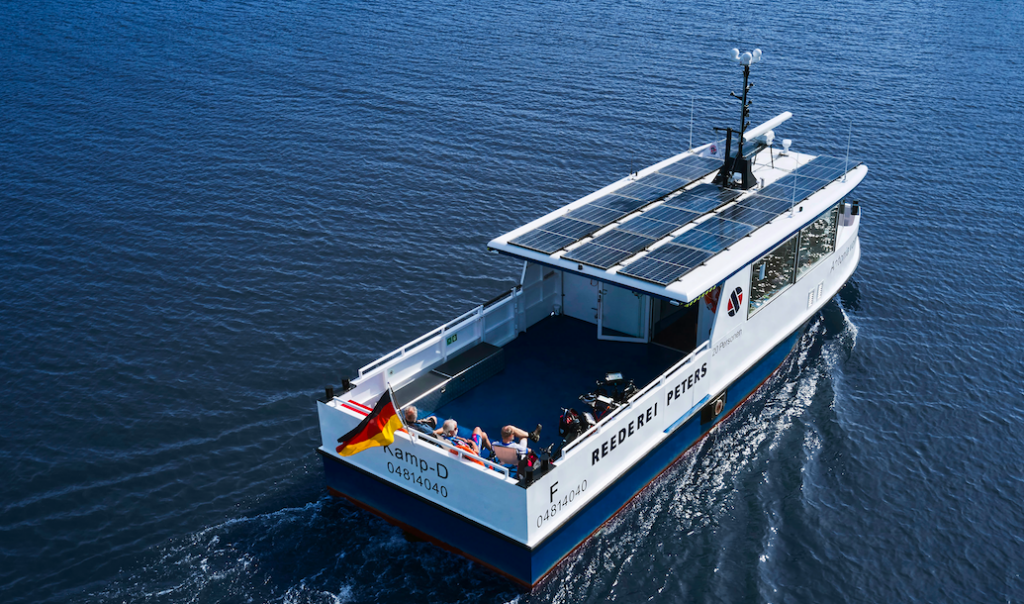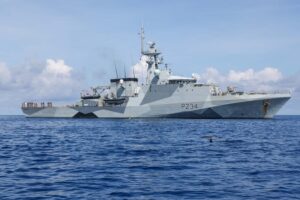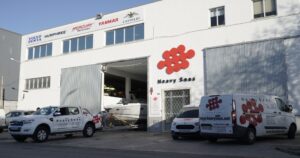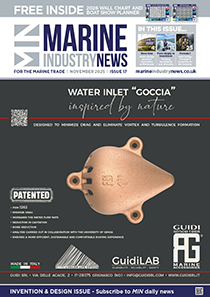German passenger ferry powered by sun

A solar-electric ferry is now being used on the Baltic Sea. The 14.65m emission-free vessel is operating several times a day between the village of Kamp on the German mainland and the island of Usedom (part of the 350-km Berlin – Usedom cycle route).
The solar ferry travels the same route as the previous, diesel-powered ferry, which lost its operating license a couple of years ago. That created a problem for the village of Kamp, where the ferry departs for the mainland.
“People still arrived on bicycles and wanted to get on the ferry. But then they realised: the ferry is gone. For our tourism, it was a disaster. Really tough,” says Siegfried Henck, who presides over the local harbour association.
The association decided to organise a new ferry service.
“It would have been nonsense [to build] something with diesel again,” Henck says.
The Antonia vom Kamp operates at 8 km/h with a max speed of 15 km/h and is propelled by a single, 60 kW Deep Blue electric azimuth thruster (rudder propeller). The system is completed by two Deep Blue batteries with a total capacity of 80 kWh and a 4.3 kWp solar installation. The boatbuilders, Ostseestaal and Ampereship, estimate that the new solar-electric propulsion system will save twenty tonnes of CO2 every year.
“We can cover our energy needs almost entirely with the photovoltaic system,” says Kay Peters, managing director of Oderhaff Reederei Peters GmbH, the company that operates the new ferry. But the solar-electric Deep Blue system does more than just generate its own energy – it saves, too.
“Electric motors only consume energy when the ship is moving,” Peters says.
A diesel engine would continue to run during passenger loading and unloading, wasting fuel and money.
“Here we have no gearbox, no losses, nothing. The ongoing costs in terms of maintenance, oil changes, and spare parts are much lower.”
“When you take a ferry out of operation for maintenance, you’re losing money every minute. Solar-electric water taxis and ferries are more than just clean and green,” says Tommi Salonen, Torqeedo GmbH’s senior vice president sales. “Electric drives like Deep Blue require much less maintenance and insulate their owners from fuel price volatility.”
Ingo Schillinger, business unit manager commercial shipbuilding of Ostseestaal / Ampereship GmbH says the delivery of the new Usedom ferry, is contributing to bringing e-mobility to the water.
“In Torqeedo we have found a reliable partner that delivers the entire drive train from a single source. This helps to build the ferry on time and within the budget,” says Schillinger. In recent years, the two companies have become one of Europe’s market leaders in the construction of electric-solar ships for professional inland navigation.
Oranje Nassau, a 20m, 55-passenger sightseeing boat and water taxi operating on Berlin’s waterways was recently put back into service after its diesel engine was replaced with a fully integrated all-electric propulsion system by Torqeedo.
Main image courtesy of Christian Brecheis.











